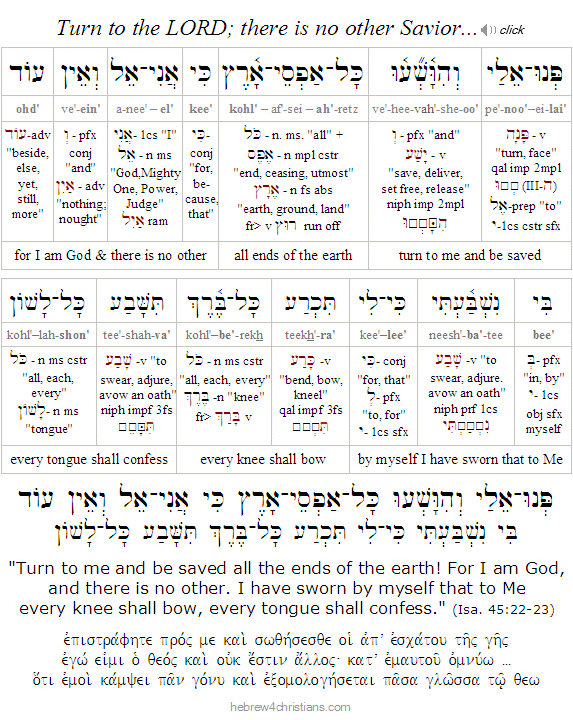|
In Jewish thinking, Rosh Hashanah commemorates the creation of Adam and Eve, and therefore it may be regarded as their "birthday" of sorts. However, on the soon after Adam and Eve were created, they disobeyed God and were sent into exile from the orchard, and therefore Rosh Hashanah commemorates humanity's rebellion against God as well... As such, this holiday has an inherent ambivalence about it. On the one hand we rejoice over the gift of life and acknowledge God as our Creator and King (the sound of the shofar is intended to remember the coronation of God as our King), while on the other hand we tremble over God as our holy and righteous Judge. Consequently, in Jewish tradition Rosh Hashanah is associated with the Day of Judgment (ΧΧΦΉΧ ΧΦ·ΧΦΌΦ΄ΧΧ) when God decrees who will be "written in the Book of Life (Χ‘Φ΅Χ€ΦΆΧ¨ ΧΦ·ΧΦ·ΧΦΌΦ΄ΧΧ)" for another year of life. According to the sages, we can "affect" the divine decree by turning to God (i.e., teshuvah: ΧͺΦΌΦ°Χ©ΧΧΦΌΧΦΈΧ), by honestly accounting for our actions (i.e., cheshbon ha-nefesh: ΧΦΆΧ©ΧΦ°ΧΦΌΧΦΉΧ ΧΦ·Χ ΦΌΦΆΧ€ΦΆΧ©Χ), and performing acts that demonstrate penitence (such as making amends to others and giving charity). The notion that we can merit God's favor during this time is clearly expressed by Abraham Heschel, who wrote, "No word is God's final word. Judgment, far from being absolute, is conditional. A change in man's conduct brings about a change in God's judgment" (The Prophets, 194).
The Scriptures clearly state that "it is appointed for man to die once, and after that comes judgment" (Heb. 9:27), and they further warn that on the Day of Judgment, anyone's name not written "in the Book of Life of the Lamb who was slain" (ΧΦΌΦ°Χ‘Φ΅Χ€ΦΆΧ¨ ΧΦ·ΧΦΌΦ΅Χ ΧΦ·Χ©ΦΌΧΦΆΧ ΧΦ·ΧΦΌΦΈΧΧΦΌΧΦ·) will be thrown into the lake of fire (Rev. 13:8, 20:15). Indeed, Yeshua Himself is the none other than the Judge of mankind to whom every knee shall one day bow (Isa. 45:22-23; Rom. 14:11; Phil. 2:10). Yeshua is the Judge of all the earth (John 5:22; 12:48; Acts 10:42, 17:31; 2 Thess. 1:7-10; Rev. 20:11-15), including the judge of all those who profess to obey Him (Rom. 14:12; 2 Cor. 5:10; 2 Tim. 4:1; Matt. 7:22-23). As Messianic believers, we maintain that our personal "Judgment Day" has come and justice has been served through the sacrificial offering of Yeshua for our sins (2 Cor. 5:21). He is the perfect fulfillment of the Akedah of Isaac, and the sound of the shofar recalls the sacrifice of the promised seed. However, even though we believe that we are made acceptable in God's sight solely by the finished work of the Messiah (Titus 3:5-6), we understand that we will one day face our own personal judgment. Even in the glorious light of the cross, we all must give account for our lives (2 Cor. 5:10): "Every man's work shall be made manifest: for the day shall declare it, because it shall be revealed by fire; the fire will test (δοκιμά΢Ο) what kind of work each has done" (1 Cor. 3:13). Yeshua is the Judge of all people, both for those who are trusting in Him and for those who spurn his salvation.
Hebrew Lesson
Isaiah 45:22-23 reading (click):
 |
Let's return to the "birthday" of Adam and Eve and consider it in light of the birthday of Yeshua, that is, his advent as the "Son of Man," our "Second Adam," and the Savior of the world. Adam was a pattern of the king to come (Rom. 5:14). The Apostle Paul presents him as "the first man," adam ha-rishon (ΧΦΈΧΦΈΧ ΧΦΈΧ¨Φ΄ΧΧ©ΧΧΦΉΧ), while he calls Yeshua "the second man," or adam ha-sheni (ΧΦΈΧΦΈΧΦΈΧ ΧΦ·Χ©ΦΌΧΦ΅Χ Φ΄Χ). Adam is regarded as "first" in the sense of temporality and legal succession as God's vice-regent for the physical order, whereas Yeshua is regarded as "second" in the sense of being the climactic expression of God's redemption of that lost regency in the advent and victory of the Messiah.
Adam was created by a direct act of God -- not by any kind of "reincarnation," as it says, "Then the LORD God formed (ΧΦ΅Χ¦ΦΆΧ¨) the man of dust from the ground and breathed (Χ ΦΈΧ€Φ·Χ) into his nostrils the breath of life (i.e., nishmat chayim: Χ Φ΄Χ©ΧΦ°ΧΦ·Χͺ ΧΦ·ΧΦΌΦ΄ΧΧ), and the man became a living soul (i.e., nefesh chayah: Χ ΦΆΧ€ΦΆΧ©Χ ΧΦ·ΧΦΌΦΈΧ)." The word yetzer ("formed") refers to something shaped, like pottery fashioned by the hand of a potter. Just as a potter purposes a shape before forming an object, so God consciously intended the image of man. Regarding the impartation of the soul, the sages use the analogy of a glassblower who creates a glass vessel. Just as a glassblower blows into a tube to form a vessel from molten glass, so the "breath of God" (i.e., neshamah: Χ Φ°Χ©ΧΦΈΧΦΈΧ) becomes spirit (i.e. ruach: Χ¨ΧΦΌΧΦ·) to form the human soul (i.e., nefesh: Χ ΦΆΧ€ΦΆΧ©Χ). The Targum states that God breathed into Adam the ability to think and to speak. In other words, thought and speech are two primary characteristics of the image (tzelem) and likeness (demut) of God. The very first creative act of God, then, was to impart the divine "image" to mankind, which primarily involved giving people the ability to experience God's awesome transcendence, to reason, to use language, etc.
Adam was made "like" God, but his soul was created, that is, it was not eternal or preexisting. Only Yeshua is the "Word made flesh," the "image of the invisible God," and the "radiance of the glory of God and the exact imprint (ΟΞ±ΟΞ±ΞΊΟὡΟ, 'character') of his nature" (Col. 1:15). All of creation is being constantly upheld by the word of His power (Heb. 1:3): "All things were created by Him (i.e., Yeshua), and for Him" and in Him all things consist (ΟΟ
Ξ½Ξ΅ΟΟηκΡν, lit. "stick together") (Col. 1:16-17). The miracle of the incarnation - the Absolute Paradox - is that the Creator Himself "emptied himself" by freely choosing to be clothed "in the likeness of sinful flesh" to become a sacrificial offering for our sin so that the righteousness of God could be fulfilled in us (Rom. 8:3-4). It is for this reason that the Word of God became flesh and "tabernacled" with us (Isa. 45:22-23; Phil. 2:6-7; John 1:1,14).
Both Adam, the first man of the earth, and Yeshua, the second man of heaven, were "sons of God," born sinless and in unhindered communion with God, and both were subsequently tested by God (Gen. 2:16-17; Matt. 4:1; Heb. 4:15). The first man failed the test, however, which led to the fatal disease of sin infecting his progeny (Rom. 3:23; 5:12-ff), whereas the second man passed the test which led to eternal healing and life to his progeny (1 Cor. 15:21-23; Rev. 2:7). Yeshua is called the "second man" in the sense that he was God's beginning for a recreated humanity, and through him humanity would be restored to the paradise of God. "The life was in Him, just as it was originally in the first Adam (John 5:26). Yeshua is called the "Son of Man" (ΧΦΌΦΆΧΦΎΧΦΈΧΦΈΧΦΈΧ), the new High Priest of humanity, who comes "with the clouds of heaven" to offer up his life for our reconciliation with God (Isa. 53:5; 1 Pet. 3:18; Heb 2:9). Yeshua's sacrificial death destroyed the power of death and undid the curse that befell fallen human nature (Rev. 22:3). Just as Adam is the "federal head" of the (fallen) human race, so Yeshua is the "federal head" of a new creation of redeemed humanity (Eph. 5:23). Through Adam comes the transmission of physical human life (i.e., the "Adamic nature"), whereas through Yeshua comes the transmission of eternal life (i.e., the "new nature" given through divine inheritance). Yeshua is the "first fruits" from the dead - a new "type" of resurrected human life that is restored to heaven's fellowship. Adam was given dominion over creation (Gen. 1:26), whereas Yeshua is Adon ha-kol (ΧΦ²ΧΧΦΉΧ ΧΦ·ΧΦΌΧ), the LORD over all (Acts 10:36).
If the title "Son of man" (ΧΦΌΦΆΧΦΎΧΦΈΧΦΈΧΦΈΧ) reveals the continuity of humanity in Yeshua with the humanity represented by Adam, it also reveals the new step that humanity has gained in the victory mediated to us in the "Man, Yeshua the Messiah" (1 Tim. 2:5). The incarnation of Yeshua was intended to lift us up from the old, Adamic nature, to be partakers of the divine nature, and therefore Yeshua is called "the firstborn (ΧΦ·ΧΦΌΦ°ΧΧΦΉΧ¨) among many brethren" (Rom. 8:29). Yeshua is not only called the "Second Man," the founder and head of a new race, but also "the Last Adam" (i.e., adam ha-acharon: ΧΦΈΧΦΈΧ ΧΦΈΧΦ·ΧΦ²Χ¨ΧΦΉΧ) because there is no other man to succeed Him, and His victory is entirely sufficient for our everlasting deliverance.
Thus it is written, "The first man Adam became a living being"; the last Adam became a life-giving spirit. But it is not the spiritual that is first but the natural, and then the spiritual. The first man was from the earth, a man of dust; the second man is from heaven. As was the man of dust, so also are those who are of the dust, and as is the man of heaven, so also are those who are of heaven. Just as we have borne the image of the man of dust, we shall also bear the image of the man of heaven (1 Cor. 15:45-49). "For as in Adam all die, so also in Messiah shall all be made alive" (1 Cor. 15:22). The "new seed" of life given to us in Yeshua makes us into a "new creation" (ΧΦΌΦ°Χ¨Φ΄ΧΧΦΈΧ ΧΦ²ΧΦΈΧ©ΧΦΈΧ) that fully restores the defaced image of God within us (2 Cor. 5:17). We are "more than conquerors" (α½ΟΞ΅ΟνικῢμΡν, lit. "hyper conquerors) through Him that loved us (Rom. 8:37).
 |
Just as God produced a bride from the wound he made in the sleeping Adam (Gen. 2:22), so a spiritual bride was produced when Yeshua suffered the "sleep of death" for everyone upon the cross, as evidenced by his pierced side after his death (John 19:34). Just as Adam's dream was fulfilled in Eve, so Yeshua's is fulfilled in the "bride of Messiah," his called-out assembly that follow him (Eph. 5:27). Human beings by nature are all connected with the first Adam as the "legal head" of the human race and are thereby subject to the sentence of death that was pronounced on him; however, all who are connected with the Second Adam are given the free gift of God's righteousness, and "have passed from death to life" (Col. 1:14; Rom. 5:17; 1 John 3:14).
It is customary to partake of a new food item, usually a new fruit, during the Rosh Hashanah Seder, which symbolically can represent for us the first fruits of Yeshua and our new creation in Him. For example, when we say, "May it be your will, LORD our God and God of our fathers, that our merits be numerous as the seeds of a pomegranate," may we understand this to be in reference to the fruitfulness we now have in the new life our Messiah gives....
A lot more could be said on this subject, of course, but this will have to suffice for now. Just as God opened Adam's eyes on the very first Rosh Hashanah, so our eyes will be opened when we are called up to obtain our inheritance in the Messiah during the time of the rapture (1 Thess. 4:16-17). This is the great teruah and sound of the shofar to come (1 Cor. 15:51-53). Meanwhile, "The God of peace will soon crush Satan under your feet. The grace of our Lord Yeshua the Messiah be with you" (Rom. 16:20).
|



